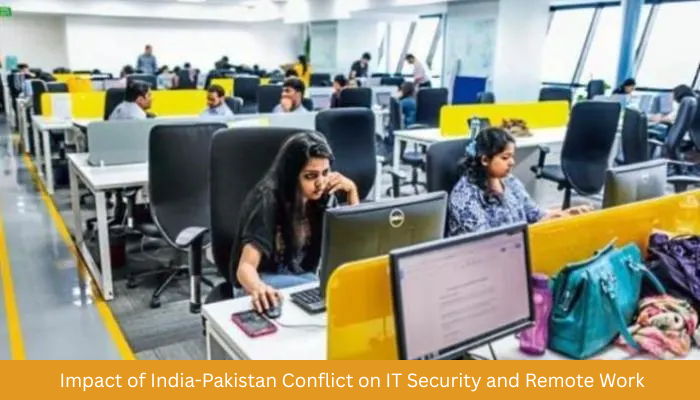In addition to raising security concerns in the border regions, the escalating geopolitical tension between India and Pakistan has also made businesses, particularly those in the information technology (IT) industry, more vigilant. India’s top IT companies have eliminated the need to report to work with immediate effect and made work from home (WFH) the main option in response to government agencies’ warnings and media stories in recent days. Along with this, all the people have been warned not to go out of the house without any need and keeping all these things in mind, the government has issued many rules and regulations.
The people’s safety is the only consideration in the government’s choice. The government’s primary goal in this case is for the work to continue and for people to be unaffected in an emergency. Sensitive cities like Delhi-NCR, Chandigarh, Jaipur, and Ahmedabad are on their limited list of places for which these regulations have been specifically issued. In this article, we will know which IT companies have taken what steps, what is their thinking regarding security and how it has affected the employees and the entire IT sector.
Initiatives of major IT companies
HCLTech: On May 9, HCLTech, the third-largest IT services provider in the nation, announced WFH for its locations in Chandigarh, Gurugram, and Noida. Based on the security circumstances and the government’s recommendations, the firm has made this decision.

Deloitte India: The organization has recommended delaying any unnecessary domestic and foreign travel. Additionally, an all-India command center hotline has been established to help staff members of all IT companies.

EY India: On May 9, the organization instructed workers in its offices in Delhi-NCR, Chandigarh, Jaipur, and Ahmedabad to use WFH. WFH has been offered to employees at different sites.

Technology Mahindra: On May 7, the corporation advised staff to stay composed and vigilant during an emergency preparedness drill. Every non-essential trip has been put on hold for a period of two weeks.

KPMG India: Based on conversations with business managers, the IT Companies has given its staff in Delhi, Gurugram, Noida, and Jaipur the option to work from home, the office, or a client site.

The Function of Government and Military Organizations
Along with the corporate sector, the central and state governments, as well as security services, have also taken swift and decisive action in response to the escalating tensions between India and Pakistan. Under the direction of the Ministry of Defense, Ministry of Home Affairs, and National Security Advisors (NSA), the highest level of alert has been issued in sensitive locations in consideration of national security. All forces have been instructed to stand ready, and more troops are being inducted to the border areas.
Increasing vigilance by way of backing by the government to maintain law and order in public places, markets, and congested areas. Security cameras have been installed in every nook and corner. Security forces keep tabs on it on a daily basis. As a precautionary measure, border states, including Delhi covering all areas of NCR, All status of Punjab, Jammu and Kashmir, and Rajasthan and Gujrathave issued orders for the temporary closure of their schools and colleges. Including enhancing security at government buildings, train stations, IT companies and airport premises.
Regarding digital security, vigilance has also been maintained by the government. The intelligence agencies have been ordered to keep an eye for heightened alertness with regard to cyber-attacks, data breaches, and online anti-national activities. IT and cyber security experts keep on vigil on the system.
In a bid to curb the spread of rumors on social media, the Ministry of Information and Broadcasting has set up special monitoring teams. These are some teams that constantly monitor illegal and misleading content on the most used social engines today such as Facebook, Instagram, YouTube, WhatsApp and Twitter and take strict action against it. Any such content that can create any confusion or panic will be removed immediately.
People have been urged by state governments and crisis management teams to remain calm, avoid rumors, believe only official information, and strictly adhere to government directives. Notify the local government or helpline right once if any suspicious activity is observed. The nation must be unified and uphold peace and security at this time.
The government apparatus works in unison to prevent widespread disorder and guarantee the safety of organizations and regular residents in any circumstance. The government and security services have not only improved border security, but they have also done everything in their power to manage any potential threats within the nation, as is evident from the whole situation.
Conclusion
As seen by the ongoing tension between India and Pakistan, being ready for any emergency has become essential in today’s business environment. In addition to demonstrating the maturity of their strategic planning, Indian IT businesses’ prompt and considerate responses demonstrate their dedication to safeguarding the security and well-being of their workforce. Initiatives like communication management, travel restrictions, and work from home choices now characterize an organization’s sensitivity and resilience.
The actions of businesses throughout this crisis show how technology-based sectors may prioritize the welfare of human resources just as much as maintaining business security. Other industries can learn from this decision because fulfilling social obligation is just as vital as maintaining company continuity.
In the event that the situation worsens in the near future, such preparation on the part of businesses might not only save them from the crisis but also establish them as symbols of stability and confidence.
Also Read : India Bans All Imports From Pakistan After Pahalgam Terror Attack
Frequently Asked Questions
Q.1: Has work from home been adopted by all IT companies?
No, work from home has not been adopted by all IT organizations. To safeguard employee safety, the majority of large enterprises, including Infosys, TCS, HCL, and Wipro, have temporarily recommended or permitted work from home in vulnerable locations.
Q.2: Will this state of affairs last for a long time?
The answer is entirely dependent on the level of tension between India and Pakistan as well as the recently issued government directives. Businesses might make plans to return to the office if everything stays peaceful. Measures like travel bans and work from home policies, however, might be in place for a while if tensions rise.
Q.3: If workers don’t show up for work, would their pay be reduced?
No, the employers have now made it clear that working from home is only temporary for safety reasons and that there won’t be any pay or other benefits cut. Businesses are making sure that workers have both financial security and a safe workplace.
Q.4: Has the government released any corporate sector advisory?
The Home Ministry and the central government have, in fact, released a general security alert for vulnerable places that stresses avoiding crowds, delaying travel, and maintaining necessary services. The corporate sector is required to abide by directives issued by numerous state governments at their level.
Q5: What is the role of IT companies in the growing tension between India and Pakistan, especially in the context of security and work from home?
India-Pakistan has to be cautious during tensions. Now, as people share all kinds of things these days, IT companies have to be cautious about cyber security. They adopt advanced security systems to keep their data safe so that security can be taken before a cyber attack happens. Also, if there is a situation of tension or danger in a city, IT companies provide work from home facility to their employees so that their work can continue and they also remain safe. The main goal of the IT sector is to provide services without interruption and ensure the safety of employees.










